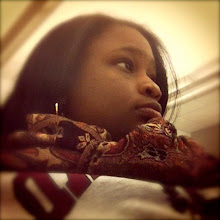
Ever get the strange feeling that you're being watched?
Well...SURPRISE! You are.
Recall that time when you walked into work or class, minding your own business. Now, you didn't realize it, but someone was discreetly peeking at you thinking, "Oh...(s)he's here." Recall that time when you spoke up in a meeting or in class. That person was thinking, "Oh...(s)he's talking, let me pay attention." Recall that time when you were with a group of friends in a public area; yes, that person was still looking at you.
It sounds creepy doesn't it? As "stalkerish" as it sounds, the truth is that we often serve as the object of someone's attention, whether they know us personally, or not. Our life, as they see it, is on display for them to critique and analyze, (hopefully) out of innocent curiosity. It could be someone that you speak to in passing, or it could be that random janitor that comes in at the end of the day. Whether you realize it or not, someone is thinking about you at this very moment; and honestly, they're probably scanning your Facebook page for its latest update.
Social media has brought about a new age of accessibility for people to get to know others, without the inconvenience of having a face-to-face conversation. These people know what you like, who you associate with and they may even know about that strange obsession that you thought was personal. Their habit of keeping tabs on you has evolved from peeking around the corner and asking others about you, to spending time scanning your latest tweets.
Now, the anonymous attention may be flattering for some, but it can also be downright scary. Users of social media sites have often treated it as something more personal than it really is. We can be so candid in our status updates and random tweets, not realizing that someone is closely following every single one. Singer Erykah Badu recently twittered through the birth of her daughter; she told the world when she was finally in labor, then proceeded to inform followers about the timing of her contractions. Her husband finally took over (I guess she was busy) and proceeded to describe the baby's crowning. He said, “I see the head, full of hair.”
Can you say, "TMI?"
The truth is, you are being constantly being watched. Even though you've set your privacy settings and may only have close friends and colleagues on your list, these social networking sites are like small towns. Nobody (and I repeat, nobody) talks to every single person in town regularly.
I have tried to narrow my own friend lists down to the people that I would at least smile at or say "hello" to in passing. But does that mean that I'm comfortable with them following me so closely? I don't think so.
As social media grows and expands to include employers, co-workers, moms, dads, the little girl you used to babysit and even Grandma (yes, Grandma); we've got to be very cautious about how we present ourselves online. Someone very close to me came very close to losing a scholarship because of something he posted on his own Facebook page. So, remember that people are always looking, and taking special attention to you, in particular. Your online representation and presentation should be like a mirrored reflection of yourself...
but try to think of it as a "Funhouse Mirror" and makes sure that it's presenting you in the most positive light (without the hairy mole and unibrow).














